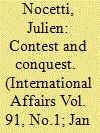| Srl | Item |
| 1 |
ID:
138340


|
|
|
|
|
| Summary/Abstract |
For more than a decade, Russia's foreign policy has sought to challenge the international consensus on a number of issues. Today, as the international internet ecosystem is becoming more volatile, Moscow is eager to shift the western narrative over the current global internet governance regime, in which the United States retains considerable leverage. In a context wherein states increasingly forge links between cyberspace and foreign policy, this article explores Russia's deepening involvement in internet governance. The disclosure by Edward Snowden of the US government's wide net of online surveillance contributed to legitimize the Russian approach to controlling online activity. While the struggle around the narrative of internet governance has been heating up since then, Russia actively seeks to coordinate internet governance and cyber security policies with like-minded states in both regional forums and the United Nations. By introducing security concerns and advocating more hierarchy and a greater role for governments, Moscow is contributing to the politicization of global cyber issues and seeking to reshape the network in accordance with its own domestic political interests. Indeed, the Russian leadership has come to consider the foreign policy of the internet as the establishment of a new US-led hegemonic framework that Washington would use to subvert other sovereign states with its own world views and values.
|
|
|
|
|
|
|
|
|
|
|
|
|
|
|
|
| 2 |
ID:
164677


|
|
|
|
|
| Summary/Abstract |
This article uses the issue area of global internet governance to investigate US hegemony in the face of a rising hegemonic challenger, China. The paper exploits the controversies around the revised International Telecommunication Regulations at the 2012 World Conference on International Telecommunications in order to examine the preferences of individual states with regard to the internet's basic principles and whether these were influenced from the outside. A quantitative analysis shows that domestic political structures that substantively clash with US liberalism, together with the unequal spread of ICT across the globe, best explain the adoption of the new regulations. There is only minimal evidence of hegemonic influence; security and trade relations were not found to influence state positions. However, aid from the US pushed autocracies toward alignment with these power's preferences. No such effect was found for democracies.
|
|
|
|
|
|
|
|
|
|
|
|
|
|
|
|